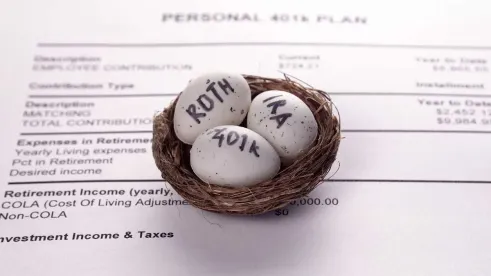On Friday, the IRS released Notice 2023-62, which addresses certain pressing implementation issues related to the SECURE 2.0 requirement that catch-up contributions for participants with FICA wages of more than $145,000 during the prior calendar year from the employer maintaining the plan must be made on a Roth basis.
In welcome news for plan sponsors, the guidance announces a two-year “administrative transition period” for implementation of this requirement, which was otherwise set to take effect on January 1, 2024. The notice confirms that, despite a drafting quirk in the SECURE 2.0 statute which suggested that catch-up contributions would be discontinued after 2023, catch-up contributions will continue to be available. The notice also outlines future guidance that Treasury and the IRS intend to issue on other Roth catch-up requirement topics.
Two-Year Administrative Transition Period
By way of brief background, a “catch-up contribution” is an elective contribution made by a participant age 50 or older that exceeds otherwise applicable plan limits. Under SECURE 2.0, starting January 1, 2024, all catch-up contributions made by participants with more than $145,000 in FICA wages from the employer maintaining the plan in the prior calendar year are required to be made on a Roth basis (i.e., after-tax). Many plan sponsors and record keepers have struggled with implementing this new rule under time pressure. In response, Notice 2023-62 offers a two-year administrative transition period for implementation of this requirement, during which:
- Catch-up contributions made by participants to whom the Roth catch-up requirement applies will be treated as satisfying the requirement even if the catch-up contributions are not designated as Roth contributions—in essence, delaying the effective date of the Roth catch-up requirement until January 1, 2026.
- Plans that do not currently permit Roth contributions may continue to allow catch-up contributions during the transition period.
Preview of Treasury and IRS Guidance Under Consideration
Notice 2023-62 also outlines guidance that the IRS intends to issue (subject to comment) regarding implementation of the Roth catch-up requirement, as described below:
- Roth catch-up requirement does not apply to participants with non-FICA wages: Guidance clarifying that the Roth catch-up contribution requirement will not apply to participants who did not have FICA wages during the preceding calendar year from the employer sponsoring the plan—for example, in the case of a participant who was a partner or other self-employed individual.
- “Deemed” Roth elections permissible for catch-up contributions: Guidance confirming that, in the case of a participant to whom the Roth catch-up requirement applies, a plan administrator and employer would be permitted to treat a participant’s election to make catch-up contributions on a pre-tax basis as a “deemed” election to make catch-up contributions on a Roth basis.
- Plans maintained by more than one employer not required to aggregate wages from multiple participating employers when applying the Roth catch-up contribution requirement: Guidance clarifying that, for purposes of applying the Roth catch-up requirement to participants in a plan maintained by more than one employer (including a multiemployer plan), FICA wages would be reviewed on an employer-by-employer basis. For example, if a participant earned $100,000 from one participating employer and $125,000 from another participating employer, the Roth catch-up contribution requirement would not apply to that participant, even though the aggregate of wages earned from all participating employers under the plan exceeded $145,000. The guidance would also clarify that the Roth catch-up requirement would apply only to catch-up contributions made on deferrals of compensation from the participating employer from whom the participant earned more than $145,000—meaning that the participant could make catch-up contributions on a pre-tax basis on compensation of $145,000 or less from any other participating employer.
Next steps for plan sponsors and employers: Although Notice 2023-62 offers some much needed breathing room for plan sponsors and employers, given the complexity of system administration, efforts should continue toward a January 1, 2026 implementation date. Written comments on the notice must be submitted by October 24, 2023—with a specific request for comments on whether a plan that does not offer Roth contributions would be permitted to discontinue catch-up contributions for highly compensated employees (but not for other groups) to comply with the SECURE 2.0 rules.




 />i
/>i


